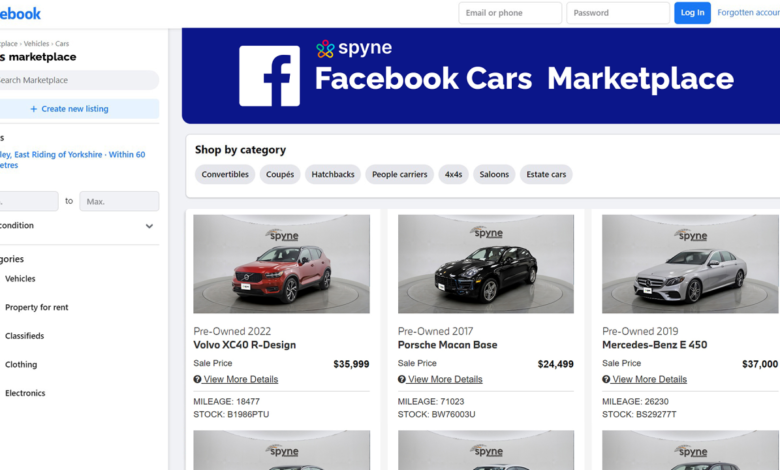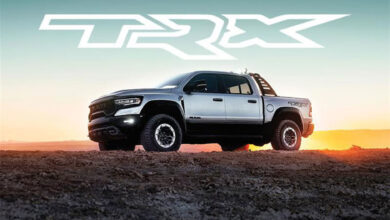A Comprehensive Guide to Facebook Marketplace Cars: Tips for Buyers and Sellers

Introduction to Facebook Marketplace Cars
facebook marketplace cars has emerged as a significant platform for buying and selling cars, attracting users with its simplicity and direct access. Launched within the social media giant’s ecosystem, it allows individuals to connect with one another seamlessly, making transactions easier than ever. With millions of users actively participating, Facebook Marketplace cars have become a prominent option for those looking to purchase or sell their vehicles.
The appeal of Facebook Marketplace lies in its user-friendly interface, which enables both buyers and sellers to navigate the platform with ease. Sellers can list their cars by uploading images, providing essential details about the vehicle, and setting their asking price. This straightforward process empowers sellers to reach a broader audience than traditional methods, such as classified ads or dealership listings. Conversely, buyers benefit from the ability to research vehicles at their own pace, directly communicating with sellers for inquiries, negotiations, and potential viewings.
Current trends in the automotive market indicate a rising interest in online sales, and Facebook Marketplace aligns perfectly with this shift. Many users now prefer shopping for cars online due to the convenience and increased access to a wide variety of options. From used cars to better-priced, pre-owned vehicles, Facebook Marketplace serves as a dynamic hub that features a vast selection. The platform also reflects the growing emphasis on local transactions, allowing users to find cars in their vicinity, thereby minimizing shipping costs and facilitating personal interactions during the buying process.
In this evolving landscape, Facebook Marketplace has solidified its place as a key player for those interested in engaging with the automotive market, providing an effective bridge between buyers and sellers while keeping the transaction process straightforward and efficient.
Benefits of Using Facebook Marketplace for Car Transactions
Facebook Marketplace has quickly become a prominent platform for buying and selling vehicles, offering a variety of advantages that cater to both buyers and sellers. One of the primary benefits is the extensive reach that Facebook provides. With billions of active users, Facebook Marketplace connects sellers to a diverse pool of potential buyers, elevating the chances of a successful transaction. This large audience is particularly beneficial for sellers looking to maximize visibility and for buyers seeking a wide range of options in the market.
Another significant advantage is the convenience that Facebook Marketplace offers. Users can browse listings for cars from the comfort of their own homes, eliminating the need for time-consuming trips to dealerships or other purchase points. The platform allows users to filter searches based on specific criteria, such as location, make and model, and price range, making it easier to find the right vehicle that meets individual needs. This ease of access appeals to a growing number of consumers who prefer online shopping experiences.
Additionally, the ability to communicate directly with sellers through Facebook Messenger enhances the buying and selling experience. This instant messaging feature allows potential buyers to ask questions, negotiate prices, and arrange test drives with ease. Furthermore, Facebook Marketplace encourages price comparison among similar listings, empowering buyers to make informed decisions based on market value. The platform’s transparency is further enhanced by user reviews and ratings, which help establish trust and confidence in the transaction process. In summary, utilizing Facebook Marketplace for car transactions offers a broad audience reach, convenience, direct communication, and transparency that enriches the experience for both buyers and sellers alike.
How to Effectively Search for Cars on Facebook Marketplace
Searching for cars on Facebook Marketplace can be a streamlined and efficient process if approached methodically. The platform offers robust search functionalities that enable users to find vehicles that meet their specific requirements. To start, it is essential to enter relevant keywords related to the desired car, which can include make, model, or other distinct features. This initial search can significantly narrow down the options available.
Once the initial search results populate, utilize the filtering options provided by Facebook Marketplace. These filters allow users to set parameters for their search, such as price range, vehicle age, and mileage. For example, if you have a specific budget in mind for Facebook Marketplace cars, setting the price range filter will eliminate listings that do not fit financially, thus enhancing the likelihood of finding a suitable vehicle.
Additionally, consider adjusting the location settings to control the distance from your home or preferred area. This is particularly beneficial if you aim to test drive the car or arrange for pickup. You can choose to see listings from local sellers, providing you with a host of options that are convenient to access. Furthermore, refining your search by make and model can help ensure that you are presented with cars that align closely with your preferences, minimizing unnecessary browsing time.
Another important feature is the sorting function, which allows users to order search results based on different criteria such as price or newest listings. This can be especially useful for finding the best deals or the latest arrivals in the marketplace. By utilizing these functionalities effectively, potential buyers can significantly improve their chances of discovering their ideal vehicle in a timely manner.
Identifying Reliable Sellers and Buyers on Facebook Marketplace
When navigating the extensive listings of Facebook Marketplace cars, it is crucial to identify reliable sellers and buyers to ensure a successful transaction. One of the first steps in this process is to thoroughly assess user profiles. A trustworthy seller typically has a well-established profile, complete with a profile picture and a history of interactions within the Marketplace. Take the time to explore their activity; frequent engagement in the community, such as buying and selling items regularly, is a positive signal.
While examining seller profiles, be vigilant for red flags that may indicate potential issues. Look for any inconsistencies in their profile information, such as discrepancies in location or lack of previous transactions. A seller who is hesitant to provide additional information or offer answers to direct questions could be a warning sign. Likewise, buyers should ensure that sellers provide accurate descriptions and photos of the vehicles listed on Facebook Marketplace, as this reflects their approach to integrity in the sale.
Another essential aspect of assessing credibility is the history of communication. Engaging in detailed conversations about the Facebook Marketplace cars can reveal a lot about both the seller and buyer. If a seller is unclear about the vehicle’s condition or unwilling to discuss essential maintenance and repair histories, it may be wise to reconsider. Furthermore, always check for seller ratings if they are available. Positive feedback from previous transactions can significantly enhance trustworthiness.
To solidify the confidence in your transaction, consider conducting background checks. Research the seller through their social media presence, or ask for additional identification. Utilizing these verification methods will help ensure that your dealings on Facebook Marketplace are smooth and secure, ultimately leading to a favorable buying or selling experience.
Common Pitfalls to Avoid When Buying Cars on Facebook Marketplace
Engaging in facebook marketplace cars transactions on Facebook Marketplace can be advantageous, particularly in the automotive sector. However, potential buyers must remain vigilant regarding common pitfalls that can arise. One prevalent issue is price manipulation. Sellers may list cars at deceptively low prices to attract interest, only to claim the price is an oversight or to influence further negotiations once contact has been established. It’s crucial for buyers to conduct comparative research on similar listings to assess the fairness of the price before proceeding.
Digital scams pose another significant danger when exploring Facebook Marketplace cars. Scammers can create fictitious listings, using stolen photographs or information from legitimate sources. Buyers should be cautious when encountering deals that appear “too good to be true” and should avoid making any payments before verifying the seller’s authenticity and the vehicle’s existence. Additionally, communication outside the platform can increase the risk of falling victim to fraud; thus, maintaining conversations within Facebook Marketplace is advisable.
An essential aspect of securing a good deal involves a thorough inspection of the vehicle. Potential buyers should not skip the opportunity to examine the car in-person and, if feasible, get a mechanic’s evaluation before completing the purchase. This diligence can help uncover hidden issues that may not be apparent in online descriptions. Ensuring all paperwork, such as titles and service history, is legitimate is also vital in securing a trustworthy transaction.
In summary, by being aware of these common pitfalls associated with buying cars on Facebook Marketplace, individuals can navigate the platform more safely and effectively. With careful research and diligent inspection practices, both buyers and sellers can mitigate the risks often associated with online car sales.
Tips for Making a Successful Offer on Facebook Marketplace Cars
When engaging with Facebook Marketplace cars, understanding how to formulate a successful offer is vital. To begin, thorough market research is essential. Review similar listings within your locality to gauge the typical price range for the specific make and model you’re interested in. Pay attention to aspects such as vehicle age, mileage, and condition. Websites and tools that aggregate car values, such as Kelley Blue Book or Edmunds, can also provide additional insight into a fair price. By having data-driven information, you’ll be better prepared to approach the seller with a reasonable offer.
Once you have established a fair price, consider your negotiation tactics. Begin with a polite message expressing your interest in the vehicle. When making your offer, it may be effective to initially start below your target price, allowing room for negotiations. This technique shows your willingness to discuss, and sellers may be amenable to adjust their asking price. However, it’s important to remain respectful; aggressive tactics may alienate the seller and hinder potential negotiations.
Throughout the conversation, maintain open communication. Ask questions regarding the car’s history or any repairs it may have undergone. A knowledgeable seller may provide additional insights, allowing you to refine your offer further. If the seller is reluctant to lower the price or negotiate effectively, knowing when to walk away is crucial. The vast selection of Facebook Marketplace cars ensures that there will always be other options, making it essential to resist overcommitting to a particular deal.
By conducting thorough research, employing effective negotiation strategies, and having the confidence to walk away when necessary, you can secure a favorable deal on Facebook Marketplace cars. Maintaining a strategic approach will empower buyers throughout the purchase process.
Understanding Vehicle History Reports
When purchasing used cars on platforms like Facebook Marketplace, it is crucial for buyers to utilize Vehicle History Reports (VHRs). These reports serve as an essential tool that can provide valuable insights into a vehicle’s past and help consumers make informed decisions. VHRs typically contain detailed records of ownership, accident history, mileage anomalies, and any associated title brands, such as salvage or flood titles. Accessing this information is straightforward; buyers can obtain VHRs from various online services such as Carfax or AutoCheck by entering the vehicle’s unique identification number (VIN).
The significance of VHRs cannot be overstated, as they can reveal potential red flags. For instance, a vehicle previously involved in significant collisions or reported as stolen might entail a higher risk. Such data can dramatically influence purchasing decisions for those exploring options on Facebook Marketplace cars. While a pristine exterior might initially entice a buyer, the underlying history captured in the VHR can provide a clearer picture of the vehicle’s condition and reliability.
Additionally, although VHRs are incredibly informative, it is imperative to consider a professional inspection before finalizing any purchase. An inspection can unveil issues that may not have been recorded in the vehicle’s history. For example, mechanical problems or unsafe modifications may create safety concerns that a VHR might not highlight. Therefore, investing in both a VHR and a comprehensive physical inspection is a prudent strategy for potential buyers on Facebook Marketplace. By combining these approaches, individuals can significantly enhance their chances of making a well-informed purchase, ultimately ensuring that they choose a vehicle that meets their needs and expectations.
Steps to Take After Buying a Car on Facebook Marketplace
When you have successfully purchased a vehicle through Facebook Marketplace cars, there are several important steps to follow to ensure that your new investment is legally compliant and well protected. The first crucial action is to complete the necessary paperwork. This includes obtaining a bill of sale, which acts as proof of the transaction. The bill should detail the purchase price, vehicle identification number (VIN), and the names and addresses of both the buyer and seller. It is advisable to keep a copy of this document for your records.
Next, you will need to transfer the title of the vehicle. The seller must sign the title over to you, and it’s essential to ensure that it is done accurately to prevent any future complications. Depending on your state’s regulations, you might need to complete additional forms as part of this process. Be sure to familiarize yourself with local laws pertaining to vehicle ownership transfers, as these can vary significantly.
Insurance is another critical area to address after acquiring a car. Before driving your new vehicle, you should secure an insurance policy that meets your state’s minimum requirements. Many insurance companies offer coverage specifically for used cars purchased online, so it may be beneficial to shop around for the best rates and coverage options.
Lastly, registration is a key step in legitimizing your new vehicle. You will need to visit your local Department of Motor Vehicles (DMV) or designated agency to register the car in your name officially. Bring all relevant documents, such as the bill of sale, signed title, and proof of insurance. Completing these steps promptly will not only help you avoid legal issues but also ensure a smooth ownership experience with your Facebook Marketplace car.
Conclusion
In conclusion, successfully navigating Facebook Marketplace cars requires a careful approach that emphasizes research, communication, and vigilance. Buyers and sellers alike stand to benefit significantly by understanding the intricacies of this evolving platform. With the vast array of vehicles available, conducting thorough research on the car’s history, pricing, and market trends is vital. This can help buyers avoid scams and sellers set competitive prices based on current demand.
Furthermore, effective communication with potential buyers or sellers cannot be understated. It is essential to ask pertinent questions, clarify details regarding the vehicle’s condition, and ensure transparency regarding all aspects of the transaction. Utilizing clear and open dialogue can lead to a more satisfactory outcome for both parties involved. For instance, discussing the reason for the sale or the car’s maintenance history can foster trust and signal good faith in negotiations.
Moreover, remaining vigilant while using Facebook Marketplace is crucial. This entails being aware of common scams, verifying user profiles, and assessing vehicle listings critically. Engaging in face-to-face meetings in safe public locations and performing test drives can further protect against potential fraud or misrepresentation. Staying informed about your rights as a buyer or seller is equally important, as it equips you with the knowledge needed to handle any unforeseen issues that may arise.
Ultimately, by prioritizing research, effective communication, and vigilance, users can navigate Facebook Marketplace cars with confidence. This platform offers a myriad of opportunities for both buying and selling vehicles, making it a valuable resource in today’s automotive marketplace. Taking these steps can lead to successful transactions that benefit all parties involve
You May Also Read This Usaworldtoday.




